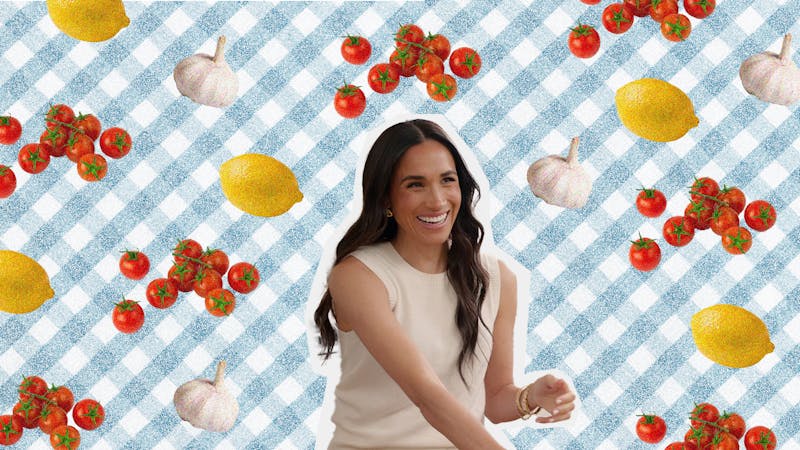What do bath salts, honey, popcorn, pasta, beeswax candles, honey lemon cake, and tea have in common? All of these goods were featured in the first episode of With Love, Meghan, a new Netflix cooking show that features Meghan Markle and her friends.
In this series, the Duchess of Sussex invites guests to an estate in Montecito, Calif. and shares recipes, hospitality, and lifestyle tips with viewers. At its surface, With Love, Meghan is comforting—the type of show that romanticizes life; college students can turn it on while doing homework and think, “I wish I could be looking out over beautiful mountains and a dreamy landscape from a balcony right now.” The warm music and calming voices fill serene silence with the comfort of delicious desserts and gorgeous home decor.
This show was first brought to my attention when scrolling through my TikTok feed and seeing videos commenting upon Markle’s “single skillet spaghetti.” In the episode “Hello, Honey!,” the Duchess is seen harvesting honey, making snacks, and creating a tea bag for a bath. By far the most unique dish in the episode is her pasta recipe, where she cuts up cherry tomatoes, garlic, places raw uncooked spaghetti on top with lemon zest, and pours boiling water in the skillet to cook the dish. She then adds vegetables and garnishes the dish on pristine plates. This unconventional method of cooking pasta seemed to have been received negatively by viewers, as many critiques aimed for Markle.
However, it might not just be the raw pasta that sparked controversy. It is not uncommon for chefs on cooking shows to introduce new innovative spins or cooking methods to their audiences. I distinctly remember sitting on the sun–bleached couch in my living room watching The Pioneer Woman and Girl Meets Farm and seeing my favorite treats being altered to save time and effort. This can be as simple as blanching broccoli before putting it in a skillet with chicken for a delicious chicken and broccoli dish, or as complex and scientific as making a no–knead bread with salami inside. These cooking hacks are usually received positively, inspiring viewers with interesting ways to make familiar dishes and learn fun new recipes.
So this poses the question: Is there something else that is fueling the backlash? Is Markle receiving negative reactions only for her unconventional pasta recipe, or because of her recent history and conflict within the royal family? When Meghan Markle first married Prince Harry, the British public was quick to scrutinize their relationship; she faced extreme judgment, prejudice, and racism, even from members of the royal family. The microaggressions and hate did not just take shape in the form of comments made towards her individually, but also towards her unborn child. Another criticism that the Duke and Duchess have faced since stepping down from their royal duties and moving to the United States centers on authenticity. While Markle uses her lifestyle show as a way to portray her life in a genuine and realistic way, she contradicts her desires through hosting With Love, Meghan in a kitchen that is not inside of her own home. Not only this, but critics of the couple also have pointed out that although the main reason justified by the Sussexes for leaving their royal duties was privacy, they are simultaneously profiting off of their publicity through podcasts and documentaries. Even now, Markle is still unpopular in the public eye, with approval ratings of 19% and 43% in the United Kingdom and United States respectively.
Martha Stewart’s recently updated one–pan pasta recipe follows a similar method to Markle’s but, by contrast, it is considered one of her most “popular recipes” and there are far fewer critics. Stewart’s dish gets praised for being simple and delicious; Markle, on the other hand, gets accused of copying Stewart’s recipe and is criticized for “not knowing how to cook pasta.” Of course, there are more traditional ways to cook cultural food, and betraying those methods could be considered problematic and insensitive. In this scenario, however, the aim of these recipes is not to cause harm, but to help viewers make a delicious dish without using too much cookware.
When two people demonstrate very similar recipes, and one is criticized more than the other, external factors likely influence these different responses. Cooking shows within the entertainment industry have historically been exclusionary towards people of color, there being limited diversity among the hosts. Even within the culinary industry itself, in 2019, 67% of culinary chefs were white, 9% were Hispanic, Latino, or Spanish, and 6% were Black or African American.
While people are more willing to put their trust into professionals and specialists, there are also plenty of celebrities who have shared their recipes with fans and haven’t received as much hate as Markle has—take Taylor Swift’s chai sugar cookies and Jennifer Garner’s cinnamon apple muffins, for example. So what’s one common denominator between these Food Network chefs and celebrities? They have little to no association with the royal family: some of the most beloved and respected public figures, especially within the United Kingdom. The eyes of the public are following the royal family constantly, and when something happens that is not “traditional” to their lifestyle, the public can be quick to protect them by placing blame on the disruptive individuals.
With Love, Meghan has the intentions of painting a positive image of Markle and showing her core values of family and friendship, but the criticisms and negative comments pointed towards the former actress speak more about how dislike can stem from audience bias and parasocial relationships. We think we understand a celebrity’s personality just because we hear so much about them in the media, but it is important to challenge public criticism against individuals and form our own informed conclusions.
